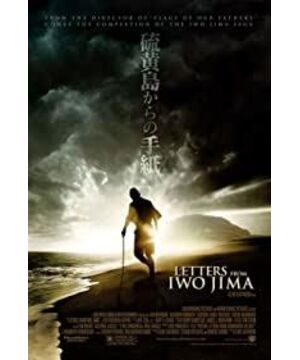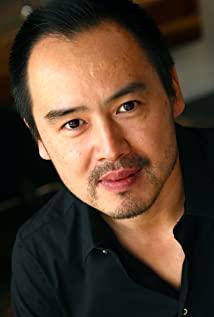I really admire director Clint Eastwood more and more. Many directors like to make a certain type of movie, and he really dares to make a variety of themes. There are romantic movies like "Long Dreams of the Covered Bridge". Crime films like The Mule, The Perfect World, Mystic River, sports films like My Dollar Baby, biopics like American Sniper, The Lamentations of Richard Jewell, and of course these two The war sister films "Letter from Iwo Jima" and "The Flag of the Fathers". Director Eastwood is also a master of economics. The most expensive blasting scenes, gun battle scenes, two shots in different directions, plus some literary dramas that do not burn much money, have become two big-selling movies. What I particularly admire is that, as an American, he actually made a movie from the perspective of the Japanese army, which is actually very rare. His anti-war thoughts not only stop at the impact of war on the United States, but also reflect on him. What the war meant for Japan.
What I find difficult about war themes is that the genders are all male, the clothing is uniform, and the characters are generally stronger. It is difficult for some characters with many similarities to leave a deep memory for the audience. And the best thing about this movie is that he takes a point-and-shoot approach, showing the entire war from the perspective of a few main characters. In order to make these characters more three-dimensional, and also to point the point, the main characters basically show his life before the war by writing family letters and memories, which constitutes a sharp contrast with the brutal war on Iwo Jima.
Xixiang is the first narrator of the film, and basically the entire war is shown to everyone from his perspective.
He was only 20 years old. He used to run a bakery before. Later, the military police came to the bakery to grab meat, noodles, and kitchenware in the name of confiscating strategic materials. In a scene that made people angry and laughed, Xixiang and his wife said, Don't be afraid, there is nothing worth robbing in our house, but unfortunately you guessed wrong in Xixiang, there are no people if there is nothing. The aunt of the neighborhood committee madly taught his wife, and Xixiang enlisted in the army. Although the aunt of the neighborhood committee has only one line, it is really impressive. There are always people who say that in the War of Resistance Against Japanese Aggression, it was the Japanese soldiers who were guilty, and the Japanese civilians were innocent. I don’t agree with this sentence. Among the Japanese civilians, there are also people like the aunt of the neighborhood committee. This kind of militant, and there are also Japanese soldiers like Saigo who were forced to join the army (it's just a pity that these people are inevitably bloody in the war, and can no longer maintain their nature).
Saigo, as a new recruit, failed to shoot, and did not understand the strategic significance of defending the barren Iwo Jima. He watched his colleagues and friends around him die one by one. The first to die was Bai Yuan, who died in a fool's errand. He didn't die from enemy fire, but from dysentery. This section shows the harsh environment of Iwo Jima from the side. Without fresh water, it can only rely on rainwater, insects and ants are rampant, and dysentery is frequent.
The U.S. airstrike began, and Yamazaki, a soldier in charge of reviewing letters, was killed. Saigo was obviously frightened when he saw such a bloody scene for the first time. The U.S. airstrikes continued, and the Japanese escaped by hiding in caves. The war started, and Xixiang, who was in charge of guarding Zhebo Mountain, saw the machine gunner in front of him being blown into pieces, and was ordered to commit suicide collectively by Army Cao Gutian, watching his comrades beside him die beyond recognition, but Xixiang thought His wife and children, he ran away, and successfully persuaded Shimizu to escape together. Along the way, Xixiang saw the comrades who were burned alive by the U.S. military, as well as the U.S. military who were beaten to death by their comrades. The hostile sides seemed to be no different.
Xixiang and Qingshui retreated with the officers and soldiers in the northern cave. In the hail of bullets, only Xixiang and Qingshui crawled forward and successfully reached Wonsan. Lieutenant Ito, who was severely brainwashed, almost chopped off the heads of the two, but was fortunately stopped by Lieutenant General Kuribayashi. After Lieutenant Ito disobeyed the military order and was demoted, the two followed Colonel Nishi. After the death of Colonel Nishi, Shimizu and Saigo negotiated to surrender to save their lives. As a result, after Shimizu surrendered, he was still killed by the US military, so Saigo had to continue to retreat to the headquarters where Lieutenant General Ribayashi was located. Lieutenant General Li Lin learned that Xixiang still had an infant child, and deliberately left him to organize documents and take other soldiers to launch the final attack. Saigo, who had sorted out the Japanese army's belongings, finally saw Lieutenant General Ribayashi commit suicide. After so many deaths, Saigo was no longer the coward he used to be. He waved his shovel frantically, and the war turned people into other people. a pattern.
Lieutenant General Kuribayashi Tadashi, the Japanese commander-in-chief at the Battle of Iwo Jima
Tadashi Kuribayashi shown in the movie is a perfect person in the eyes of normal people. He was appreciated by the leaders and accepted orders when he was in danger. He had overseas study experience, understood the ideas of Americans, knew each other, and had a harmonious family relationship. He loved soldiers and did not support corporal punishment. Despite being outnumbered, it still hit the U.S. military hard, taking the lead without fear of life and death. In Xixiang's eyes, he was a good officer, who saved his life several times and loved the soldiers. In the eyes of Colonel Nishi, he is a friend who can talk happily about the past. However, in the conflict between the navy and the army under the brainwashing of militarism, in the eyes of most Japanese generals and soldiers, he is a lunatic, he does not understand war at all, he is greedy for life and fears death, and he is a sympathizer of the United States. These officers and soldiers have lost their normal cognitive abilities, which is terrifying.
After Lieutenant General Ritsubayashi arrived on the island, he first surveyed the terrain on foot, protected Saigo and Kashihara, who were physically punished, and evacuated the civilians. Knowing that they had been deceived by their superiors, the army on Iwo Jima had no naval and air support at all, and finally decided to abandon the beachhead to build an underground fortress. The war began. At the beginning, only the beachheads that the Navy insisted on building were all killed. Lieutenant General Kuribayashi ordered to preserve their strength and all the surviving soldiers retreated, but Major General Lin and Admiral Adachi insisted on collective suicide. Lieutenant General Li Lin has a lot of skills, but he was not recognized by his subordinates when he was ordered in danger. So many officers and soldiers did not obey the order, and he was very helpless. Seeing that there were fewer and fewer soldiers and weapons around, and a large number of soldiers committed suicide, Lieutenant General Kuribayashi led the remaining soldiers to attack and died tragically.
Lieutenant General Kuribayashi is a very contradictory person. He is a very trendy person. He has studied abroad for many years and has a certain affection for the United States. He also knows that this war is a disaster for everyone and every country. At the same time, he is still a very conservative person, no matter what his true thoughts are, as a soldier, he strictly follows the orders of his superiors, even if the order is to let him die.
Nishizuka is a noble born Olympic champion
Legend has it that Zhongxi Zhongzuo is a very handsome man. He used to be an Olympic champion and is a personal friend with many celebrities. He was also a well-informed man, and he was the first to report the fleet's annihilation to Lieutenant General Kuribayashi. He knew he was fighting a deadly battle, but he was still optimistic about riding and drinking and chatting. In accordance with Lieutenant General Kuribayashi's orders, Nishizhong Zuo sacrificed his soldiers for nothing, punished Lieutenant Ito who violated the military order, and also treated the wounded American soldiers. Colonel Nishi recalled his life in the United States, the happy time he had with his American friends, and it is really embarrassing that the two countries are now fighting against each other. This is the first time that many soldiers in the cave have talked to a live American. They have never dealt with Americans before. In the brainwashing of militarism, they thought that Americans are cannibals. This time they understood Americans and Japanese are not the same, they are ordinary people living their lives. It is a pity that the very good Colonel Nishi also had to face the fate of suicide after being injured.
Shimizu's dismissed military police
The arrival of Qingshui made Xixiang and others very taboo, because Qingshui's military police background, the role of the military police is a bit like the Dongchang of the Ming Dynasty. They are not used to fight the US military, but to investigate and punish their own people who do not support the war. . Seeing that Shimizu recites the weaknesses of the U.S. military so skillfully (in fact, it is the unreal U.S. military that Japanese militarism deceives its own people), the training of the military police is indeed more severe than that of the ordinary army, yes, after all, their task is to deal with themselves Humans are more likely to be hindered by emotions when dealing with themselves. How can we not cultivate ruthless robots.
But in essence, Shimizu and Xixiang are the same kind of people. They just want to live their own little life and don't want to participate in the war at all. He was expelled from the gendarmerie because of his sympathy for a puppy. He was also superstitious and brought a thousand-person needle belly roll. He hesitated when the chief took the lead in committing suicide, and finally returned to Wonsan with Xixiang. He hoped that surrender would save his life, but unfortunately the U.S. military was unreliable, and he was mercilessly killed.
Lieutenant Ito defies the order of the navy to take the initiative to attack
There are many generals who don't like Lieutenant General Li Lin. Brigadier General Osugi, who concealed his military situation, was transferred away by Li Lin on the pretext of illness (transferring can save his life, which is not a bad thing), and Lieutenant General Anda, who refused to execute the order and took the lead in committing suicide, has always refused to accept Lieutenant General Li Lin's secret. Major General Lin who ordered the attack. But obviously it is Lieutenant Ito who gets the most attention in the film. There was a real sense of grey humor in his experience. He was a subordinate of Major Lin, and he wanted to take back Mount Zhebo. After being demoted, he even planned to use the method of human bombs to die with the US tanks, but unfortunately he did not encounter a tank. The whole group shouted to charge and sacrifice, but by accident, they lay flat among the dead, and were finally captured by the US military. The person who least wanted to be a prisoner became a prisoner. This is the absurdity of war.
The person in charge of the South Cave of Mount Oriba, who ordered the mass suicide by Admiral Adachi
The scene of mass suicide is really impressive. Saigo can't understand it, and I can't understand why Lieutenant General Rigiri asked him to retreat to the northern cave to continue fighting, but he would refuse, and instead insisted on committing suicide. According to Saigo, it is a greater contribution to the emperor to continue to fight while alive, and it is true that he has not yet reached a situation where he must die. Until I saw the part where Xixiang and Shimizu negotiated to surrender, I finally understood. Admiral Adachi may be another form of expression of Saigo and Shimizu. Saigo and Shimizu have endured enough non-stop wars and hope to leave the battlefield by being captives, and Admiral Adachi has also endured enough non-stop wars, but He couldn't choose to be a prisoner, because he was a general, not a soldier. He was probably not treated well when he was captured, and his wife and children far away in the homeland might also be persecuted by the gendarmerie, so the only way to escape the battlefield was to commit suicide. As for the officers and soldiers at all levels below the mid-advisor, what do they think? Some people may be really loyal to the country, some people may be brainwashed, and some people, like Nozaki, a good friend of Saigo, clearly miss their family members and are reluctant to die, but they have to die under the coercion of their superiors.
Army Cao Gutian punishes junior officers in Xixiang
The sergeant is a relatively low-ranking officer, and the smaller the officer, the bigger the air. Because Saigo said something unpatriotic, Tanita would beat him, regardless of how nervous the people on Iwo Jima were. Because Xixiang failed to pass the target, he was punished to polish everyone's shoes. Lieutenant General Li Lin ridiculed him. He might as well clean his guns. The war is about to start, and he has no time to wash his face. Is it important to polish shoes. In short, Gu Tian is a petty official who has no vision and only plays the role of official prestige. Although he had no vision, he was very loyal. When Colonel Anda ordered a mass suicide, he personally took the soldiers and killed himself.
View more about Letters from Iwo Jima reviews









